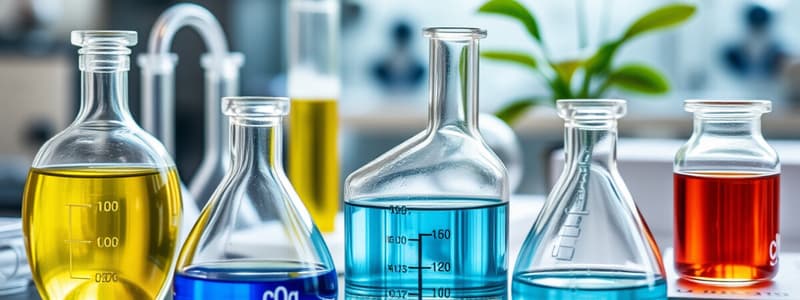Podcast
Questions and Answers
What is matter?
What is matter?
- A substance that cannot be broken down chemically
- A mixture of substances that retain their properties
- Anything that occupies space and has mass (correct)
- A reaction that changes the properties of a substance
What is mass?
What is mass?
The quantity of matter an object has.
What is an element?
What is an element?
Substances that cannot be broken down chemically into simpler kinds of matter.
What is an atom?
What is an atom?
What does the nucleus consist of?
What does the nucleus consist of?
Where are protons located and what is their charge?
Where are protons located and what is their charge?
Where are neutrons located and what is their charge?
Where are neutrons located and what is their charge?
What do electrons do?
What do electrons do?
What is atomic number?
What is atomic number?
What is mass number?
What is mass number?
What is an electron?
What is an electron?
What is an orbital?
What is an orbital?
What is an isotope?
What is an isotope?
What is a compound?
What is a compound?
What is a mixture?
What is a mixture?
What is a chemical bond?
What is a chemical bond?
What is a covalent bond?
What is a covalent bond?
What is a molecule?
What is a molecule?
What is an ion?
What is an ion?
What is an ionic bond?
What is an ionic bond?
How are isotopes of the same element alike?
How are isotopes of the same element alike?
Why is water called a polar molecule?
Why is water called a polar molecule?
What is the pH scale?
What is the pH scale?
Why does pure water have a neutral pH?
Why does pure water have a neutral pH?
What is a buffer?
What is a buffer?
What is the role of enzymes in living systems?
What is the role of enzymes in living systems?
What is energy?
What is energy?
What is metabolism?
What is metabolism?
What is a chemical reaction?
What is a chemical reaction?
Flashcards are hidden until you start studying
Study Notes
Chemistry of Life Concepts
- Matter: Anything that occupies space and has mass.
- Mass: The quantity of matter in an object.
- Element: Substances that cannot be chemically broken down into simpler types.
- Atom: The smallest particle of an element retaining its properties.
- Nucleus: Composed of protons and neutrons, it constitutes most of an atom's mass.
- Proton: Positively charged particle within the nucleus.
- Neutron: Neutral particle within the nucleus.
- Electron: Negatively charged particles that orbit the nucleus.
Atomic and Molecular Structure
- Atomic Number: Represents the number of protons in an atom, defining its chemical properties.
- Mass Number: Total count of protons and neutrons in an atom.
- Orbital: 3-D region indicating the probable location of electrons around the nucleus.
- Isotope: Same element differing in the number of neutrons.
- Compound: Substance formed from two or more elements chemically bonded in fixed proportions.
- Mixture: Physical blend of non-chemically bonded substances.
Chemical Bonds
- Chemical Bond: Attractive forces holding atoms together.
- Covalent Bond: Formed when atoms share one or more pairs of electrons.
- Ionic Bond: Attraction between positively and negatively charged ions.
Chemical Reactions
- Energy: The capacity to perform work.
- Chemical Reaction: Process where reactants transform into products.
- Reactant: Substances that undergo change in a chemical reaction.
- Product: Resulting substances formed from a chemical reaction.
- Metabolism: Set of life-sustaining chemical reactions in organisms.
- Activation Energy: Energy required to initiate a chemical reaction.
- Catalyst: Substance that lowers activation energy and speeds up reactions.
Enzymes and Reactions
- Enzyme: A biological catalyst that accelerates metabolic reactions without permanent change.
- Redox Reaction: Involves reduction (gain of electrons) and oxidation (loss of electrons).
- Oxidation: Loss of electrons, leading to a positive charge.
- Reduction: Gain of electrons, leading to a negative charge.
Properties of Matter
- States of Matter: Solid (fixed shape and volume), Liquid (fixed volume, variable shape), Gas (fills container shape, no fixed volume).
- Cohesion: Force holding molecules of a single substance together.
- Adhesion: Attractive force between particles of different substances.
- Capillarity: Liquid's ability to rise in narrow tubes due to cohesion and adhesion.
Solutions and pH
- Solution: Mixture of one or more substances uniformly distributed within another.
- Solute: The substance dissolved in a solution.
- Solvent: The substance that dissolves the solute.
- Concentration: Amount of solute in a given solution volume.
- Saturated Solution: Contains maximum solute that can be dissolved.
- pH Scale: Measures hydrogen ion concentration; ranges from 0 (acidic) to 14 (basic).
- Buffer: Substance that neutralizes minor pH fluctuations in solutions.
Importance of Water
- Polar Molecule: Water has uneven charge distribution, with oxygen attracting electrons more strongly than hydrogen.
- Properties Importance: High specific heat, cohesion, adhesion, surface tension, density, universal solvent role, and polarity are crucial for supporting life.
- Neutral pH: Pure water has balanced ion concentrations, making it neither acidic nor basic.
- pH Control: Necessary for maintaining health as imbalances can lead to diseases.
Miscellaneous
- Role of Enzymes: Accelerate reactions and lower activation energy in living systems.
- Carbonic Anhydrase: An enzyme critical for transporting oxygen in the blood; interfered by disruptive molecules can lead to serious health issues.
- Hydrogen Bond: Interactions linked with the properties of cohesion, adhesion, and capillarity are essential for water's behavior in various biological systems.
Studying That Suits You
Use AI to generate personalized quizzes and flashcards to suit your learning preferences.




